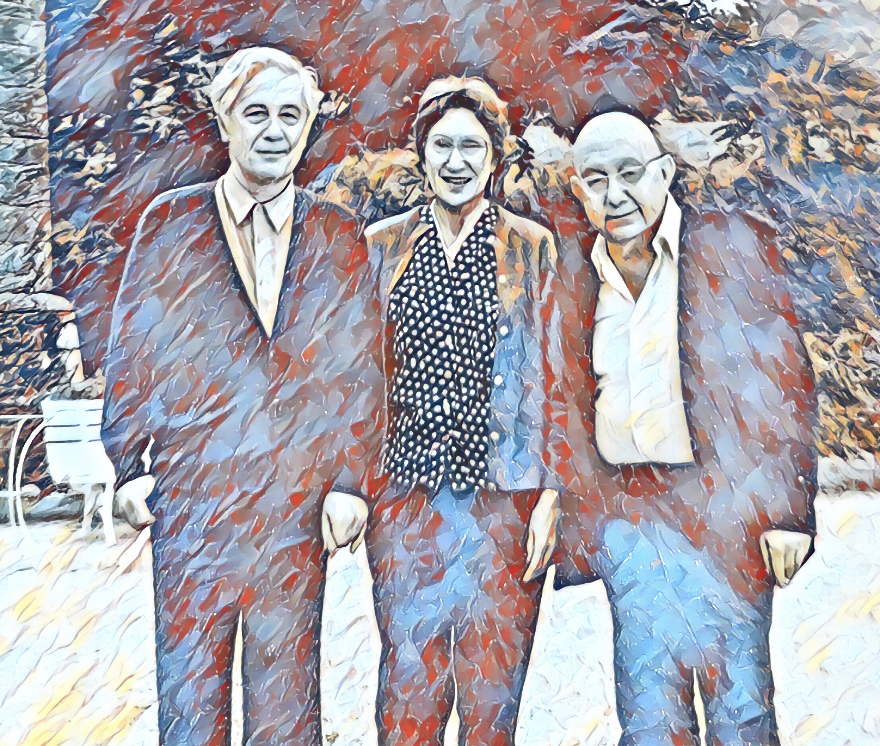Editorial note: Cornelius Castoriadis died December 26, 1997 (aged 75) in Paris, France. The eulogy for him below, delivered at his funereal, is by Chris Pallis, also known as Maurice Brinton, the eminent British Neurologist, co-founder of the London Solidarity group, and early translator of Castoriadis into English. Pallis died March 10, 2005. The AorB group inherited this text from Pallis’s personal archive. We have chosen to supplement here it with supporting multi-media.
By Maurice Brinton
We recall your first ‘political’ visit to England. It was in the autumn of 1960. You spoke to a group of comrades who, for a variety of reasons, had just left, or been expelled from the SLL (Socialist Labour League), a Trotskyist organisation. What struck us most was your commitment to change, the rigour of your arguments, the width of your knowledge of history, philosophy and economics, your wit, and your capacity to link up the various strands of our own preoccupations. We emerged convinced that, from whatever angle we envisaged the SLL, its problem was not that it was not a proper trotskyist organisation but that it was one!
The implications led, gradually but relentlessly, to a critique of leninism and later to a critique of marxism itself. Our horizons widened, and with the creation of the Solidarity groups we became active in various industrial rank-and-file struggles, in the struggles of tenants and students, and in the anti-bomb movement. Your analysis of the bureaucratisation affecting organisations traditionally committed to social change (trade unions and political parties) evoked immediate echoes. And so did your analysis of the bureaucratic phenomenon in general, whether encountered in the peace movement, in education, in hospitals or in other areas of civil society.
The sense of enjoyment and freedom with which we acted remains one of our lasting memories of the following decade. We did not then use the term ‘autonomy to describe what we did: our actions were however deeply permeated with a spirit you had helped inculcate: the spirit of self-managed endeavour.
Then came the French events of 1968. They were, we felt, a blinding corroboration of so much that you had written. Some of us in England lived through those events as intensely, I believe, as comrades in France. No pre-determined theory of history could account for what millions were feeling and creating on a daily basis.
Your subsequent visits to england are remembered as so many breaths of fresh air. Together we would discuss the crisis of modern society, but also its power to recuperate dissent. You always listened carefully to what we had to say, at times placing it in a context we had not envisaged.
A Trotskyist guru who had attended your very first meeting in London, had left muttering ‘this is anarchism disguised as marxism’. Your thoughts however were much wider than either. You knew we were not in a Petrograd cellar in 1917. Or in Barcelona in 1936. You were a revolutionary who related to the world of his own day. The need to do so remains one of the main legacies you left us.
I will end by quoting some words from one of Charles Trenet’s songs:
‘Longtemps, longtemps, longtemps après que les poètes ont disparu
Leurs chansons trainent encore dans les rues…’
[English translation: “Long, long, long after the poets are gone
Their songs still hang in the streets…”]
The word poet derives from the Greek poiein (to create). In that sense, Cornelius, you were a poet.
Dear comrade and friend, we part today but your work will continue to inspire us and many others for a very long time.
Charles Trenet – L’Ame Des Poètes
Lyrics:
Long, long, long
Longtemps, longtemps, longtemps
After the poets have disappeared
Après que les poètes ont disparu
Their songs still run through the streets
Leurs chansons courent encore dans les rues
The crowd sings them a little distracted
La foule les chante un peu distraite
Ignoring the author’s name
En ignorant le nom de l’auteur
Without knowing who their heart beat for
Sans savoir pour qui battait leur cœur
Sometimes we change a word, a sentence
Parfois on change un mot, une phrase
And when we run out of ideas
Et quand on est à court d’idées
We go la la la la la la
On fait la la la la la la
La la la la la la
La la la la la la
Long, long, long
Longtemps, longtemps, longtemps
After the poets have disappeared
Après que les poètes ont disparu
Their songs still run through the streets
Leurs chansons courent encore dans les rues
Their light soul is their songs
Leur âme légère, c’est leurs chansons
Who make you happy, who make you sad
Qui rendent gais, qui rendent tristes
Girls and boys
Filles et garçons
Bourgeois, artists
Bourgeois, artistes
Or wanderers
Ou vagabonds
